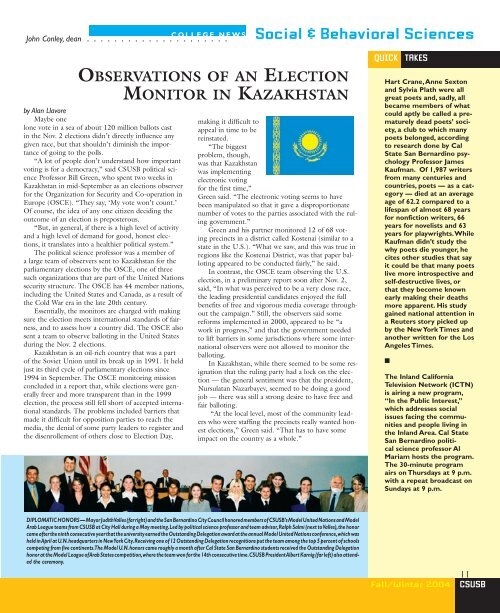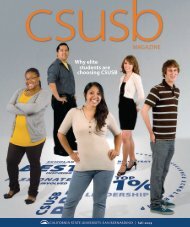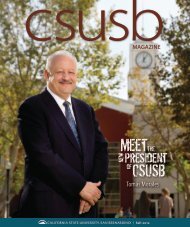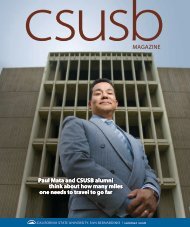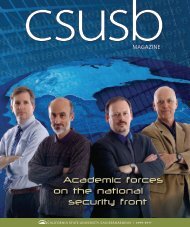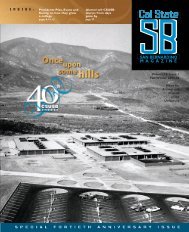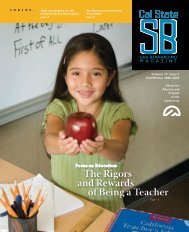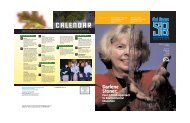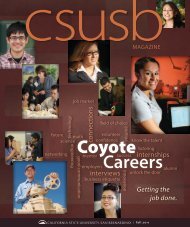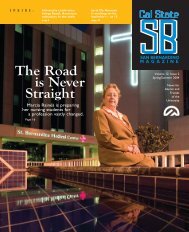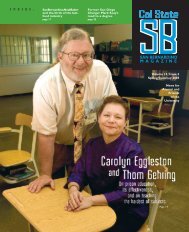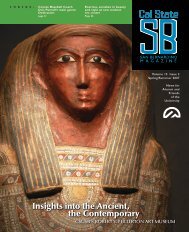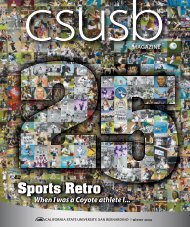04 Fall2.indd - CSUSB Magazine - California State University, San ...
04 Fall2.indd - CSUSB Magazine - California State University, San ...
04 Fall2.indd - CSUSB Magazine - California State University, San ...
Create successful ePaper yourself
Turn your PDF publications into a flip-book with our unique Google optimized e-Paper software.
C O L L E G E N E W SJohn Conley, dean . . . . . . . . . . . . . . . . . . . . .Social & Behavioral SciencesOBSERVATIONS OF AN ELECTIONMONITOR IN KAZAKHSTANby Alan LlavoreMaybe onelone vote in a sea of about 120 million ballots castin the Nov. 2 elections didn’t directly influence anygiven race, but that shouldn’t diminish the importanceof going to the polls.“A lot of people don’t understand how importantvoting is for a democracy,” said <strong>CSUSB</strong> political scienceProfessor Bill Green, who spent two weeks inKazakhstan in mid-September as an elections observerfor the Organization for Security and Co-operation inEurope (OSCE). “They say, ‘My vote won’t count.’Of course, the idea of any one citizen deciding theoutcome of an election is preposterous.“But, in general, if there is a high level of activityand a high level of demand for good, honest elections,it translates into a healthier political system.”The political science professor was a member ofa large team of observers sent to Kazakhstan for theparliamentary elections by the OSCE, one of threesuch organizations that are part of the United Nationssecurity structure. The OSCE has 44 member nations,including the United <strong>State</strong>s and Canada, as a result ofthe Cold War era in the late 20th century.Essentially, the monitors are charged with makingsure the election meets international standards of fairness,and to assess how a country did. The OSCE alsosent a team to observe balloting in the United <strong>State</strong>sduring the Nov. 2 elections.Kazakhstan is an oil-rich country that was a partof the Soviet Union until its break up in 1991. It heldjust its third cycle of parliamentary elections since1994 in September. The OSCE monitoring missionconcluded in a report that, while elections were generallyfreer and more transparent than in the 1999election, the process still fell short of accepted internationalstandards. The problems included barriers thatmade it difficult for opposition parties to reach themedia, the denial of some party leaders to register andthe disenrollement of others close to Election Day,making it difficult toappeal in time to bereinstated.“The biggestproblem, though,was that Kazakhstanwas implementingelectronic votingfor the first time,”Green said. “The electronic voting seems to havebeen manipulated so that it gave a disproportionatenumber of votes to the parties associated with the rulinggovernment.”Green and his partner monitored 12 of 68 votingprecincts in a district called Kostenai (similar to astate in the U.S.). “What we saw, and this was true inregions like the Kostenai District, was that paper ballotingappeared to be conducted fairly,” he said.In contrast, the OSCE team observing the U.S.election, in a preliminary report soon after Nov. 2,said, “In what was perceived to be a very close race,the leading presidential candidates enjoyed the fullbenefits of free and vigorous media coverage throughoutthe campaign.” Still, the observers said somereforms implemented in 2000, appeared to be “awork in progress,” and that the government neededto lift barriers in some jurisdictions where some internationalobservers were not allowed to monitor theballoting.In Kazakhstan, while there seemed to be some resignationthat the ruling party had a lock on the election— the general sentiment was that the president,Nursulatan Nazarbayev, seemed to be doing a goodjob — there was still a strong desire to have free andfair balloting.“At the local level, most of the community leaderswho were staffing the precincts really wanted honestelections,” Green said. “That has to have someimpact on the country as a whole.”QUICK TAKESHart Crane, Anne Sextonand Sylvia Plath were allgreat poets and, sadly, allbecame members of whatcould aptly be called a prematurelydead poets’ society,a club to which manypoets belonged, accordingto research done by Cal<strong>State</strong> <strong>San</strong> Bernardino psychologyProfessor JamesKaufman. Of 1,987 writersfrom many centuries andcountries, poets — as a category— died at an averageage of 62.2 compared to alifespan of almost 68 yearsfor nonfiction writers, 66years for novelists and 63years for playwrights. WhileKaufman didn’t study thewhy poets die younger, hecites other studies that sayit could be that many poetslive more introspective andself-destructive lives, orthat they become knownearly making their deathsmore apparent. His studygained national attention ina Reuters story picked upby the New York Times andanother written for the LosAngeles Times.■The Inland <strong>California</strong>Television Network (ICTN)is airing a new program,“In the Public Interest,”which addresses socialissues facing the communitiesand people living inthe Inland Area. Cal <strong>State</strong><strong>San</strong> Bernardino politicalscience professor AlMariam hosts the program.The 30-minute programairs on Thursdays at 9 p.m.with a repeat broadcast onSundays at 9 p.m.DIPLOMATIC HONORS — Mayor Judith Valles (far right) and the <strong>San</strong> Bernardino City Council honored members of <strong>CSUSB</strong>’s Model United Nations and ModelArab League teams from <strong>CSUSB</strong> at City Hall during a May meeting. Led by political science professor and team advisor, Ralph Salmi (next to Valles), the honorcame after the ninth consecutive year that the university earned the Outstanding Delegation award at the annual Model United Nations conference, which washeld in April at U.N. headquarters in New York City. Receiving one of 12 Outstanding Delegation recognitions put the team among the top 5 percent of schoolscompeting from five continents. The Model U.N. honors came roughly a month after Cal <strong>State</strong> <strong>San</strong> Bernardino students received the Outstanding Delegationhonor at the Model League of Arab <strong>State</strong>s competition, where the team won for the 14th consecutive time. <strong>CSUSB</strong> President Albert Karnig (far left) also attendedthe ceremony.Fall/Winter 20<strong>04</strong>11<strong>CSUSB</strong>


